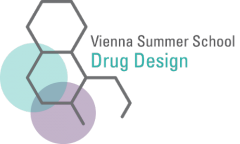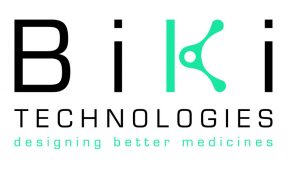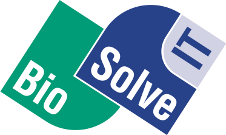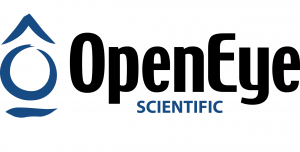Registration to the workshops was open until 31st of August 2017. Thank you for your strong interest.
BiKi Technologies • BioSolveIT • Inte:Ligand • OpenEye • Optibrium • ProBis • Schrödinger
Get the full movie, not just the final scene in protein ligand binding!
In this workshop, we will have the opportunity to setup a protein-ligand binding case study using the BiKi Life Sciences software suite. BiKi Life Sciences is the only available software that via our MD Binding algorithm is able to reconstruct the full protein ligand binding process to allow a real fully flexible docking via Molecular Dynamics.
This disruptive technology is opening new avenues on how we study drug-protein interactions delivering for the first time, in affordable computational times, the full movie and not just the final scene (the pose) as we are used by many years. All participants upon request will get a 6 months license including all the available BiKi modules including: BiKiNetics (off-rates prediction), MD Binding, Dynamical Pocket Tracking, Clustering, Hydra (Waters scoring).
On Tue, 19th September 2017, 15:00
#️⃣ maximum number of participants: 24
Expect Actives! Fast & Visual Decision Support for Any Chemist in Early Drug Hunting.
"Will ∆G improve if I put a methyl in ortho?", "Would an N here improve solubility?", "Is this a likely torsion?" — Questions like these will be answered in a playful and radically visual way using the most modern graphical tools out there. Using BioSolveIT software we will stimulate the most critical but also most creative assessment there is: Your own brain!
For example SeeSAR: Drag & drop protein and ligand, modify on-the-fly, get instant visual feedback on your idea with respect to ∆G and ADME. Check how you resonate with the computer proposal. Go improve ∆G, being guided by the desolvation-aware HYDE Coronas. Or ReCore: Simply "lasso" a scaffold to be replaced leaving the rest in place. Push "ReCore", and browse the intelligently proposed ideas seconds later, pursue what is appealing to your eye and to synthetic doability.
Listening to your top priorities during the course, let us improve your critical perspective on things; let us show you how to succeed in, for example, a structure-based design project. We will stimulate your awareness for the fine balance between desolvation penalties and directed interactions, visually guide you to improve the tightness of fit, make you raise your eyebrows on unusual torsions (and surely fix that). Ligand- or structure-based problems solved with fragment methods (FBLD), or straightforward industry standard docking are more options that you can choose from to learn.
Back home, you will be able to work on your own project. Every workshop participant shall receive a free 3-month trial license.
On Thu, 21st September 2017, 15:00 (bring your own laptop)
#️⃣ Without limitation.
Modern approaches for hit finding and molecular design in early drug discovery research
Sharon D. Bryant & Thierry Langer
Inte:Ligand supports scientists worldwide with innovative approaches for early drug discovery research using computer-aided design solutions. Join our workshop to experience modern and user friendly approaches for 3D-pharmacophore modeling, virtual screening, hit triaging, ligand profiling, docking, fragment-based compound design, finding and exploring new pockets, and how to efficiently make use of information from your molecular dynamics simulations for hit finding. We will use the full LigandScout Suite to explore innovative computer-aided design (CAD) workflows successfully used by chemists and modelers in industry and academia to address the major challenges they face in finding and designing novel bioactive molecules. Shift the odds of success in your early drug discovery research by learning and adopting these modern CAD methods.
*Participants have the option to use their own laptops for the workshop.
LigandScout, and the respective datasets should be installed in advance.
To do this contact Sharon Bryant: bryant@inteligand.com
In the subject line include: Vienna Summer School 2017
In your message, include your: Full name, Affiliation, Mailing address, E-mail address, Phone number and your computer operating system.
On Mon, 18th September 2017, 15:00
#️⃣ maximum number of participants: 24
or Tue, 19th September 2017, 15:00 (bring your own laptop)
#️⃣ Without limitation.
3D shape and chemical feature similarity as descriptors of small molecules and Ligand-based Virtual Screening (LBVS)
In this workshop, we introduce 3D shape and chemical feature similarity as descriptors of small molecules and perform Ligand-based Virtual Screening (LBVS). We will use sets of active and inactive molecules to judge the performance of different queries using appropriate statistical measures. The participants will get the chance to modify the query molecules to optimize the results of the screen. In a second part, we will use the same descriptors to perform fragment replacements on small molecules. Bioisosteric replacements and Scaffold Hopping are important techniques to find new chemical entities with improved properties (e.g. activity, selectivity, solubility,...) or to protect IP space.
On Wed, 20th September 2017, 15:00
#️⃣ maximum number of participants: 24
or Thu, 21st September 2017, 15:00
#️⃣ maximum number of participants: 24
Guided Multi-Parameter Optimisation of 2D and 3D SAR
In this workshop, we will use a combination of 2D and 3D methods to understand and optimize a virtual library of Heat Shock Protein 90 (HSP90) inhibitors. We will explore the library to develop an understanding of the 3D Structure-Activity Relationship (SAR) and then use multi-parameter optimization to further develop the absorption, distribution, metabolism and excretion (ADME) and physicochemical properties of a potent inhibitor without losing efficacy.
The workshop will use our StarDrop™ software and all participants will get a 1-month free trial license to use StarDrop following the workshop. For more information on StarDrop, please visit www.optibrium.com/stardrop or watch some videos of StarDrop in action at www.optibrium.com/community/videos.
On Wed, 20th September 2017, 15:00 (bring your own laptop)
#️⃣ Without limitation.
Explore targets on the proteome scale!
As there are numerous protein structures in the Protein Data Bank (PDB), we will try to leverage this information in the workshop and study drug targets. We will discover additional proteins which could be of interest and study small molecule ligands. We will inspect the structural similarities in binding sites, predict ligands, inspect binding modes, conglomerate all the data and study it in context of similar protein targets.
The participants will gather additional knowledge on protein drug targets and will be able study their system in the context of all available protein experimental data.
On Wed, 20th September 2017, 15:00 (bring your own laptop)
#️⃣ maximum number of participants: 20
or Thu, 21st September 2017, 15:00 (bring your own laptop)
#️⃣ maximum number of participants: 20
Schrödinger's Pharmacophore Modelling Package: Re-engineering pharmacophore perception
Schrödinger’s pharmacophore modeling package Phase is a complete, user-friendly pharmacophore modeling solution designed to maximize performance in virtual screening and lead optimization. Fast, accurate, and easy-to-use, Phase includes a novel, scientifically validated common pharmacophore perception algorithm.
The workshop will cover pharmacophore generation from sets of ligands and single ligand conformations as well as generation of pharmacophores using protein structures. To demonstrate Phase’s fast and reliable database screening capabilities, it will also include a case study for a pharmaceutical target.
On Mon, 18th September 2017, 15:00 (bring your own laptop)
#️⃣ Without limitation.






